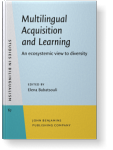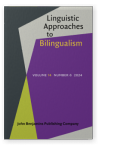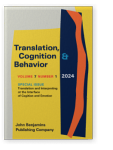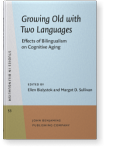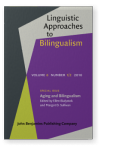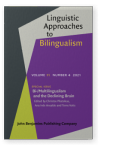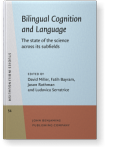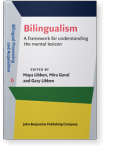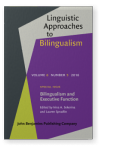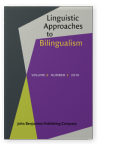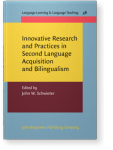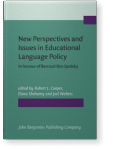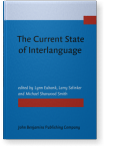Ellen Bialystok
List of John Benjamins publications for which Ellen Bialystok plays a role.
Book series
Journals
ISSN 1879-9264 | E-ISSN 1879-9272
ISSN 2542-5277 | E-ISSN 2542-5285
Titles
Growing Old with Two Languages: Effects of Bilingualism on Cognitive Aging
Edited by Ellen Bialystok and Margot D. Sullivan
[Studies in Bilingualism, 53] 2017. vi, 304 pp.
Subjects Cognition and language | Multilingualism | Psycholinguistics
Aging and Bilingualism
Edited by Ellen Bialystok and Margot D. Sullivan
Special issue of Linguistic Approaches to Bilingualism 6:1/2 (2016) vi, 226 pp.
Subjects Cognition and language | Cognitive psychology | Language acquisition | Multilingualism | Psycholinguistics | Theoretical linguistics
2021 Interpreting cognitive decline in the face of cognitive reserve: Does bilingualism affect cognitive aging? Bi-/Multilingualism and the Declining Brain, Pliatsikas, Christos, Ana Inés Ansaldo and Toms Voits (eds.), pp. 484–504 | Article
Evaluation of the cognitive level of older adults, including decisions about meeting clinical thresholds for dementia, is typically based on behavioral levels of performance. However, individuals with high cognitive reserve will outperform the levels typically associated with their brain… read more
2019 Chapter 2. The signal and the noise: Finding the pattern in human behavior Bilingualism, Executive Function, and Beyond: Questions and insights, Sekerina, Irina A., Lauren Spradlin and Virginia Valian (eds.), pp. 17–34 | Chapter
Studies on the effect of bilingualism on executive functioning have sometimes failed to find significant differences between performance of monolingual and bilingual young adults. This paper examines the interpretation of these null findings and considers the role of three factors: definition of… read more
2018 Chapter 13. Bilingualism and executive function: What’s the connection? Bilingual Cognition and Language: The state of the science across its subfields, Miller, David, Fatih Bayram, Jason Rothman and Ludovica Serratrice (eds.), pp. 283–306 | Chapter
This chapter examines the idea that much of the confusion and contradictory evidence about the relation between bilingualism and executive function can be traced to an over-simplification of the two main terms. Using more nuanced definitions for “bilingualism” and “executive function”, research… read more
2017 Chapter 1. The importance of bilingualism for the aging brain: Current evidence and future research directions Growing Old with Two Languages: Effects of Bilingualism on Cognitive Aging, Bialystok, Ellen and Margot D. Sullivan (eds.), pp. 1–8 | Chapter
2017 Chapter 8. Executive control processes in verbal and nonverbal working memory: The role of aging and bilingualism Growing Old with Two Languages: Effects of Bilingualism on Cognitive Aging, Bialystok, Ellen and Margot D. Sullivan (eds.), pp. 161–183 | Chapter
Studies across the lifespan have revealed modifications in executive control (EC) from bilingualism, but studies of working memory (WM), a key aspect of EC, have produced varied results. Healthy older (M = 71.0 years) and younger participants (M = 21.1 years) who were monolingual or bilingual,… read more
2017 The influence of contextual cues on representations in the mental lexicon for bilinguals Bilingualism: A framework for understanding the mental lexicon, Libben, Maya, Mira Goral and Gary Libben (eds.), pp. 123–142 | Chapter
The strength of each representation in the mental lexicon depends on factors such as word frequency and conceptual concreteness. For bilinguals, each concept has two lexical representations, and so representational strength also depends on the salience of first- and second-language activation and… read more
2016 The signal and the noise: Finding the pattern in human behavior Bilingualism and Executive Function: An interdisciplinary approach, Sekerina, Irina A. and Lauren Spradlin (eds.), pp. 517–534 | Article
Studies on the effect of bilingualism on executive functioning have sometimes failed to find significant differences between performance of monolingual and bilingual young adults. This paper examines the interpretation of these null findings and considers the role of three factors: definition of… read more
2016 Aging and bilingualism: Why does it matter? Aging and Bilingualism, Bialystok, Ellen and Margot D. Sullivan (eds.), pp. 1–8 | Introduction
2016 Phonologically-mediated meaning activation in monolinguals and bilinguals: Evidence from homophone effects in ERP Linguistic Approaches to Bilingualism 6:3, pp. 262–289 | Article
The current study investigated how language experience impacts phonologically-mediated meaning activation. Monolinguals and bilinguals made living/non-living judgments on English homophones (e.g., beech, beach) while Event-Related Potentials (ERPs) were recorded. Context was manipulated by making… read more
2016 Executive control processes in verbal and nonverbal working memory: The role of aging and bilingualism Aging and Bilingualism, Bialystok, Ellen and Margot D. Sullivan (eds.), pp. 147–170 | Article
Studies across the lifespan have revealed modifications in executive control (EC) from bilingualism, but studies of working memory (WM), a key aspect of EC, have produced varied results. Healthy older (M = 71.0 years) and younger participants (M = 21.1 years) who were monolingual or bilingual,… read more
2013 Chapter 10. Control and representation in bilingualism: Implications for pedagogy Innovative Research and Practices in Second Language Acquisition and Bilingualism, Schwieter, John W. (ed.), pp. 223–240 | Article
The bilingual advantage in executive functioning is often contrasted with a disadvantage in lexical access, but the two are based on different processes. The former entails fluid operations used for intentional processing (i.e., cognitive control) and the latter involves crystallized knowledge (i.e. read more
2001 Literacy: The extension of languages through other means New Perspectives and Issues in Educational Language Policy: In honour of Bernard Dov Spolsky, Cooper, Robert L., Elana Shohamy and Joel Walters (eds.), pp. 19–33 | Article
1995 Why we need grammar: Confessions of a cognitive generalist The Current State of Interlanguage: Studies in honor of William E. Rutherford, Eubank, Lynn, Larry Selinker and Michael Sharwood Smith (eds.), pp. 55–62 | Article
